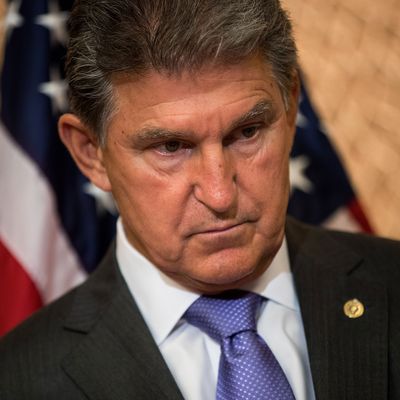
As of this writing, I and a thousand other observers of national politics are getting our first glimpse of a House Intelligence Committee memo aimed at “changing the narrative” of the ongoing investigation of possible Trump campaign collusion with Russians, or possible Trump administration obstruction of justice. Nobody really thinks the details are going to change any minds about the underlying issues. The Nunes memo is simply another hyperpartisan weapon in a hyperpartisan battle to discredit the very idea of an independent inquiry into the murky doings of foreign and domestic agents and their foreign and domestic puppet-masters.
But everyone also knows that the release of this memo will ratchet up the polarization paralyzing the nation’s capital to previously unimagined levels, as the two great tribes of American politics subscribe not just to alternative “narratives” of a particular series of episodes, but to different constructions of reality. And in this climate, it is obvious why retirements from Congress are approaching an all-time record, particularly from the majority party that is being frog-marched into the fight against the Mueller investigation in lieu of the normal preoccupations of lawmakers.
When West Virginia Democratic senator Joe Manchin responded to attacks from Vice-President Mike Pence this week by saying they were “exactly why Washington Sucks,” he expressed a sentiment that’s now endemic. The players in the nasty saga of Congress in the Trump era are beginning to tire of their assigned roles.
You have to appreciate that it takes not only drive and ambition and talent and luck to become a member of Congress; it also takes a healthy ego. Anyone who has ever worked on Capitol Hill knows that the average House or Senate office is structured like a miniature royal court. All contact with the public is made on behalf of the Sun King (or Queen) who holds the exclusive mandate to represent the supposedly sovereign public. The career ladder for congressional staff leads via abject slavery to the individual member to committee jobs that supposedly provide an opportunity for monkish absorption in legislative work, though at the sufferance of the Sun King/Queen chair, with the pot of gold at the end of the rainbow being a posh lobbying gig or maybe an electoral career of one’s own.
But the immediate day-to-day experience for all but the most exalted members and staff alike is empty drudgery, revolving around largely symbolic legislative activity, constituent-services work relying on the fiction of Congress’s ability to influence the bureaucracy, fundraising, and partisan cheerleading.
All but the most politically insulated members have to travel back and forth to their district or state weekly or biweekly in order to remain “in touch.” And those in competitive districts are forever vulnerable to adverse trends — and sometimes “waves” — that have zero to do with their individual service or specific views.
Among House Republicans, the six-year term limits on committee and subcommittee chairs has decisively interfered with the ability to build seniority-based empires. It is no accident that nine of the 21 current House committee chairs have already announced their retirement at the end of 2018. And accompanying term limits, as was clearly intended by Newt Gingrich when he introduced them in 1995, has been a large shift in control of legislation from individual members to the party leadership.
As Lee Drutman notes in an analysis of the wave of retirements, the member of Congress is increasingly “a powerless cog in a sputtering machine.”
Now everything moves through party leadership, which is increasingly writing bills on its own, cutting out committees, and giving rank-and-file members no opportunity for input. Most members are kept in the dark until the last minute and then forced to vote on legislation they had no role in crafting, with no opportunity to even look at it until right before the vote.
If being a “powerless cog” contributed materially to a legislative product that inspired pride, it might be more endurable. But the most unchangeable feature of life in Congress in recent years has been how profoundly unpopular the institution has become and remained.
Each month, Gallup measures the public’s approval of the job Congress is doing. The approval percentage has bounced around in the teens and the 20s — occasionally dipping into the single digits —since the summer of 2009. The last net-positive congressional job approval number occurred in 2004.
Does anyone think the atmosphere in Congress, or its popularity, is likely to get any better soon? It’s hard to imagine why it would. The GOP congressional leadership, supported by the White House, has all but ruled out significant legislative activity this year, barring a grand bargain on immigration that looks more elusive each day, or some convergence around a Trump infrastructure plan that looks less substantial the more it is revealed.
Meanwhile, life in Washington revolves largely around angry and obscure battles over the president’s past and present integrity, of which the Nunes memo is just the latest and stupidest example. This has to be privately depressing to Republicans, even if they cannot admit it publicly. At any given moment, they can be dragooned by a presidential tweet into yet another fight to protect Trump, his associates, and his business empire, from independent scrutiny. As the Nunes memo illustrates, being on Team Trump means subscribing to stranger and stranger conspiracy theories, and treating the Other Team as an evil cabal of semi-traitors. As Lee Drutman concludes:
Divisive polarization means constant gridlock and a Congress whose main legislative activity is voting on whether to keep the government funded every few weeks. Hardly rewarding work.
That’s particularly true if the prime directive is to give the GOP continued control of Congress to stay on its current dispiriting track, and to keep the Trump era rolling along in 2020.
If Washington Sucks for Joe Manchin, it sucks even worse for its ostensible partisan masters.






























